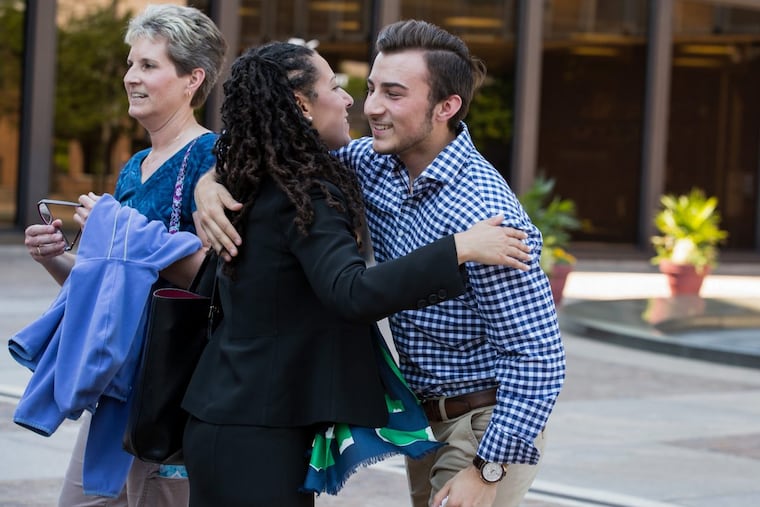Appeals court OKs Boyertown schools' policy letting transgender students use bathrooms of their choice
In a rare decision from the bench, a federal appellate court on Thursday upheld the policy of the Boyertown Area School District allowing transgender students to use bathrooms and locker rooms that correspond to their gender identity.

In a rare decision from the bench, a federal appellate court on Thursday upheld the policy of the Boyertown Area School District allowing transgender students to use bathrooms and locker rooms that correspond to their gender identity.
It took less than 20 minutes for a three-judge panel of the U.S. Court of Appeals for the Third Circuit in Philadelphia to unanimously reject arguments made by a conservative legal organization representing six students, who sued the district last year saying they felt uncomfortable after spotting transgender teens using the restrooms of their choice.
Speaking from the bench, Circuit Judge Theodore McKee said the suing students had failed to show that the district's policy infringed upon their rights to "bodily privacy" or caused them irreparable harm.
He said that he and his colleagues, Judges Patty Shwartz and Richard Lowell Nygaard, took the unusual step to rule within minutes of hearing from both sides because he knew how important the decision was to the high school students involved in the case, many of whom would be graduating within days. Typically, appellate courts issue their rulings weeks after a hearing.
"This case obviously has a great deal of interest not just to the community but to the kids at the school," he said.
The decision upheld a lower court ruling in August and joins a growing body of federal court decisions from across the country affirming the rights of transgender individuals.
But unlike many of those other cases – which involved transgender plaintiffs' challenging policies that excluded them – the matter decided by the court Thursday was brought by students seeking to strike down their district's trans-inclusive policies.
"We were not expecting a decision when we walked in the door today," said Ria Mar, an attorney with the ACLU of Pennsylvania, who had argued in favor of the district's stance. "The court got it that exclusion of transgender students is a serious issue, and it wanted to send a message that the school's policy of inclusion is the right thing to do. "
Still, Randall Wenger, a lawyer for the Harrisburg-based Independence Law Center who argued on behalf of the plaintiff students Thursday, vowed to continue their legal fight.
"We think that our claims are strong," Wenger said. "Even though the decision today was disappointing, we plan to continue this litigation to protect and ultimately vindicate the privacy rights of our clients."
Because of the court's quick action Thursday, it remained unclear just how much the circuit judges intended for their ruling to block future legal challenges to similar policies adopted by other area school districts, including those in Philadelphia, Abington, Lower Merion, New Hope-Solebury, and Cherry Hill.
Throughout the oral arguments, the judges focused on factors that made the situation in Boyertown Area Senior High School, a campus of about 1,650 in Berks County, unique. The district expanded the number of single-user bathrooms, alternative locker rooms, and private stalls across the high school's campus after implementing its policy in 2016 so that any student made uncomfortable by the change could use them.
McKee said the panel would issue a full opinion soon, explaining its legal reasoning and the scope of its decision.
Although the ruling's timing came as a surprise, the outcome was foreshadowed within minutes. The court seemed to have little sympathy for Wenger's claim that the district's policy violated his clients' privacy rights. McKee, in particular, balked at the lawyer's plea to return the high school to its status quo.
"You could have come in here during Brown v. Board of Education and said, 'Let's go back to the status quo,'" said McKee, who is African American, referencing the landmark Supreme Court decision that struck down racial segregation policies in public schools. "These types of cases wouldn't happen if the answer was always, 'Go back to the status quo.'"
The district implemented its policy under Obama-era guidelines that required all federally funded schools to recognize basic transgender student rights and decided to stick with it even after President Trump rolled back that mandate.
The case before the court began last March when one student, referenced in court filings only as Joel Doe, sued after he saw a transgender male student clad in a sports bra and shorts changing in the gym locker room.
The lawsuit quickly divided opinion among students and created rifts that were on display outside the courthouse Thursday, as former classmates on opposite sides squared off just feet from each other to advocate for their respective views.
Alexis Lightcap, a Boyertown senior, said the response she got after complaining to administrators about a transgender girl in the women's restroom was a form of discrimination.
"Instead of listening to my concerns, they made me feel like I was the problem for feeling uncomfortable, vulnerable, and unsafe with a boy in the bathroom," she said. "As a girl, I don't want a boy in the room where I change my clothing."
Aidan DeStefano, a recent Boyertown graduate and transgender male, encouraged his ex-classmates Thursday to put themselves in his shoes.
Born female, he stopped using the restroom in middle school, when he was already dressing as a boy, after other girls yelled at him to leave. He used the toilet in the nurse's office until the district implemented its new policy in his senior year.
Most classmates were immediately accepting, DeStefano said Thursday.
Of those who objected, however, he said: "Until they step into my body, they have no idea what they're talking about."